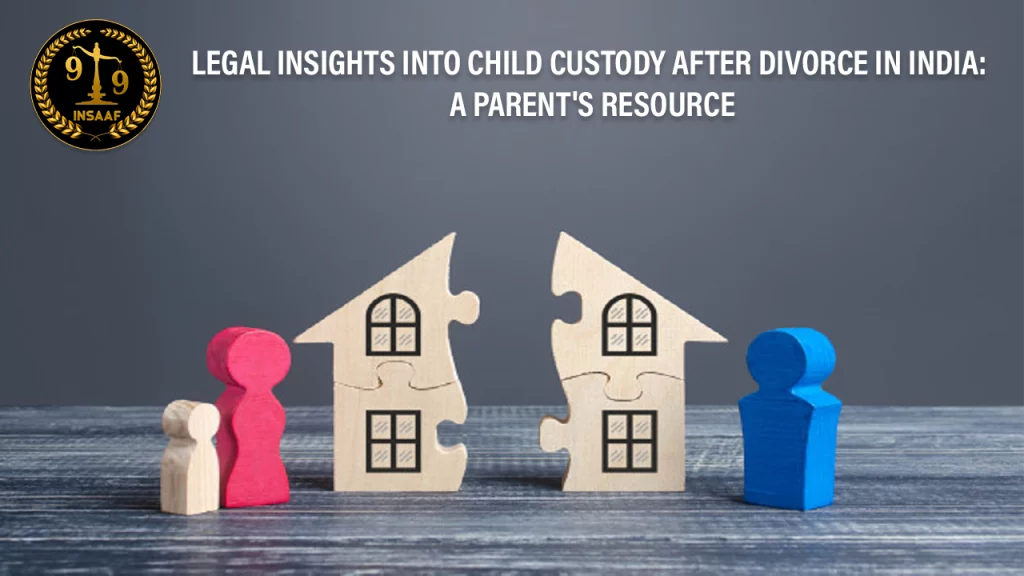

Online Legal Advice from Insaaf99® Online Lawyer Consultation in India


Online Legal Advice from Insaaf99® Online Lawyer Consultation in India

Navigating divorce and child custody issues is emotionally taxing for families. When parents choose to separate, they face crucial decisions regarding their children's care. This becomes especially challenging when disagreements arise on what's best for the children.
Child Custody after Divorce is a pivotal concern in Indian divorce proceedings, holding immense legal and emotional weight. The well-being and best interests of the child take precedence in determining post-divorce child custody arrangements. This article delves into the nuances of child custody in India, shedding light on vital terms such as "child custody," "child custody after divorce," and "child custody in divorce.
Child custody in India is a complex and nuanced legal concept it is the legal process of determining who will raise a child after a divorce or separation. This includes decisions about where the child will live, go to school, and receive medical care. Indian law recognizes two main types of child custody: physical custody and legal custody.
Physical Custody: Physical custody involves the day-to-day care and residence of the child. The parent with physical custody is responsible for the child's living arrangements and daily needs.
Legal Custody: Legal custody pertains to the authority to make important decisions about the child's life, such as education, healthcare, religion, and other major life choices.
Indian courts adhere to the "best interests of the child" principle when determining custody arrangements. This entails a comprehensive evaluation of factors, including the child's age, parent-child relationships, and any unique requirements, to ascertain the child's optimal well-being.
Child Custody Laws in India
Indian child custody laws are complex and nuanced, reflecting the country's diverse religious and cultural landscape. While personal laws play a significant role in determining child custody arrangements, courts are ultimately guided by the principle of the "best interests of the child." This means that courts will consider all relevant factors, such as the child's age, relationship with each parent, and any special needs, when making custody decisions.
The Hindu Minority and Guardianship Act, 1956: This act applies to Hindus and upholds the principle of the child's welfare as the primary consideration.
The Guardians and Wards Act, 1890: This law applies to all communities and provides a comprehensive legal framework for the appointment of guardians and custody of children.
The Muslim Personal Law: Child custody among Muslims is governed by this law, which is derived from Islamic principles. It places a significant emphasis on the welfare of the child and the mother's role in nurturing the child.
The Special Marriage Act, 1954: This act applies to interfaith marriages and provides provisions for child custody after divorce for couples belonging to different religions.
It is important to note that child custody arrangements are not permanent. As the child grows and their needs change, the court may modify the custody arrangement accordingly. Parents who are unable to agree on a custody arrangement may seek mediation or legal counsel to help them reach an agreement.

Determining Child Custody
When parents cannot agree on a child custody arrangement, the court intervenes to make a decision that is in the best interests of the child. The court considers a variety of factors, including:
The court will also consider the child's relationship with each parent and any other relevant factors. The goal is to create a custody arrangement that is in the child's best interests and allows them to thrive.
Indian courts have the authority to order a variety of child custody arrangements, depending on the specific circumstances of each case. The three main types of child custody arrangements are:
Concluding Thoughts:
Child custody after divorce in India is a nuanced and challenging issue that can be emotionally charged for both parents and children. It is important to understand the legal framework and consider the best interests of the child when making child custody decisions. Parents should prioritize the child's physical, emotional, and psychological well-being above all else.